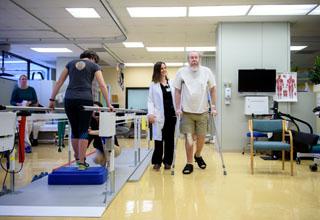Dysphagia in Seniors: What It Is and What You Should Know
Learn why some older adults develop difficulty swallowing and what signs to watch out for.

Did you know that aging can increase your risk of developing swallowing problems? Difficulty swallowing, also known as dysphagia, can impact your quality of life and pose health risks.
In my role as the speech-language pathology team lead at Hebrew Rehabilitation Center in Boston, I help diagnose the presence of swallowing difficulties, taking into account each patient’s underlying medical history, to create personalized treatment plans that make eating safer and more comfortable for people with dysphagia.
Here, I’ll break down what dysphagia is, the signs to watch out for, best practices for safe swallowing, and more. The blog post also includes contributions from my colleague Caitlin Pender, MA, CCC-SLP, speech-language pathology team lead at Hebrew Rehabilitation Center at NewBridge on the Charles in Dedham.
What is dysphagia?
Dysphagia is an impairment in one or all phases of swallowing. The three main phases of the swallow are at the levels of the mouth, the throat, and the esophagus — the tube that brings food and drinks down into the stomach. Any of those phases can be impaired. When we talk about a swallowing impairment, we consider how effective someone is at protecting their airway while swallowing and how quickly and efficiently they can get through a meal.
What goes into protecting the airway, exactly? A healthy swallow requires coordination between your brain and muscles in your throat to allow food, liquid, and saliva to go through your throat and enter into the esophagus. But if there are any impairments in that function, some food, liquid, or saliva can wind up in your airway. The term for that is “aspiration,” and that increases your risk for a lung infection called aspiration pneumonia.
Symptoms of dysphagia
Dysphagia doesn’t look the same for everyone. However, the following symptoms are some of the signs that you might notice if you have dysphagia:
- Coughing while eating and drinking
- Having difficulty chewing (outside of obvious dental problems)
- Feeling like food is stuck in your throat
- A wet or gurgly-sounding voice during meals
- Unexplained weight loss, especially when accompanied by the above symptoms
How can dysphagia impact quality of life in seniors?
- Malnutrition: Swallowing and nutrition go hand-in-hand. Dysphagia can limit someone’s options regarding what they can comfortably chew and swallow. That can make it more difficult for older adults to consume adequate food and get the proper nutrients needed. In fact, one study found that nearly 40% of patients with dysphagia are at risk for malnutrition.
- Loss of social or cultural connection: Food has a deep cultural meaning in many of our lives. Religious customs, family traditions, and social activities often involve food, which can add a layer of loss to swallowing or eating challenges.
- Aspiration pneumonia risk: Dysphagia is one of the significant risk factors for aspiration pneumonia, especially when an older adult has other medical risk factors, such as lung disease. Aspiration pneumonia is a lung infection that occurs when someone breathes food or liquid into the airway instead of being swallowed. It’s an uncomfortable condition that can lead to hospitalization.
Causes of dysphagia in older adults
While aging is a risk factor for dysphagia, it is not a typical sign of aging. Underlying health problems usually cause dysphagia.
Some of the conditions that can lead to the development of dysphagia include:
- Stroke
- Certain types of cancer
- Dementia
- Parkinson’s disease
- Significant pulmonary problems
- Uncontrolled acid reflux
- Neurological conditions
- Muscle weakness or frailty
Dementia considerations
Dysphagia is extremely common in people with Alzheimer’s disease and other forms of dementia, especially in the later stages of the disease. One systematic review found that between 84% and 93% of people with moderate to severe Alzheimer’s disease have dysphagia. If your loved one has dementia, you should look out for signs such as difficulty chewing and longer mealtimes.
If someone can’t understand or remember a speech-language pathologist's recommendations, a caregiver or family member should always be involved in their care. We often educate families and caregivers on mealtime safety precautions during appointments.
Diagnosing and treating swallowing problems
There are multiple ways that speech-language pathologists can diagnose and treat dysphagia. At Hebrew Rehabilitation Center, speech-language pathologists primarily use two key diagnostic methods: an oral motor exam and a videofluoroscopic swallowing study, or VFSS. These diagnostic methods come after a complete review of someone’s medical history.
In an oral motor exam, we look at different structures in a patient’s mouth and face and test various cranial nerves important for speech and swallowing. Depending on your symptoms and complaints, we will test your functional ability to swallow different foods and liquids and get feedback on your comfort level.
The gold standard of diagnostics is the videofluoroscopic swallowing study, an x-ray of the three phases of the swallowing process that gives us objective information about the anatomy, physiology, and function of the swallow. With this information, we can determine your next steps in terms of treatment and interventions.
Treatments fall into two categories: restorative and compensatory.
- Restorative treatments make the most sense when the underlying condition is treatable and the dysphagia is reversible. Exercises to strengthen the throat muscles are commonly prescribed in these cases.
- Compensatory treatments include treatments to compensate for the condition causing dysphagia, such as modifying the textures of food and liquids to make swallowing safer and more comfortable.
Dysphagia treatment should be personalized to each patient. At Hebrew Rehabilitation Center, we’re always considering a patient’s care goals when making a treatment plan. For example, there may be a time when the videofluoroscopic test shows that someone is aspirating thin liquids. Thickened liquids could, in some cases, help reduce someone’s risk of aspirating, but that patient may dislike the texture of thickened liquids, so we make sure to sit with families to discuss what’s important to them and the pros, cons, risks, and benefits of different options.
Managing dysphagia at home
Speech-language pathologists will recommend patient-specific interventions and mealtime safety strategies such as diet texture changes. But there are also a handful of tips we can offer as overall best practices for managing dysphagia at home:
- Keep your mouth clean with a stringent oral care program, which can include brushing your teeth and flossing up to three times daily. Why oral hygiene? If you have a lot of oral bacteria in your mouth, and the food or liquid you aspirate carries that into your lungs, it can contribute to developing an infection.
- Make sure that you are awake for the duration of the mealtime.
- Sit in an upright position rather than being reclined while eating or drinking.
- Try to take your time when you’re eating.
Outpatient speech therapy at Hebrew SeniorLife
If you or a loved one is showing signs of swallowing difficulties, such as coughing or choking during meals, speak to your provider about a referral to a speech-language pathologist. A speech-language pathologist can evaluate and treat dysphagia, which impacts the safety and quality of life in older adults.
Hebrew SeniorLife offers outpatient speech-language pathology for seniors at Hebrew Rehabilitation Center in Boston and Hebrew Rehabilitation Center at NewBridge on the Charles in Dedham. Inpatient long-term chronic care and short-term rehabilitation patients also have access to our speech-language pathology team for dysphagia treatment.
Contact us online today to inquire about an initial evaluation to determine your candidacy for outpatient treatment. Please note “outpatient speech-language pathology evaluation” in your message on the form.
Blog Topics
Learn More
Outpatient Rehabilitative Therapies
At Hebrew Rehabilitation Center in Boston and Dedham, MA, we offer adult physical therapy, occupational therapy, and speech therapy using state-of-the-art mobility and treatment equipment.





